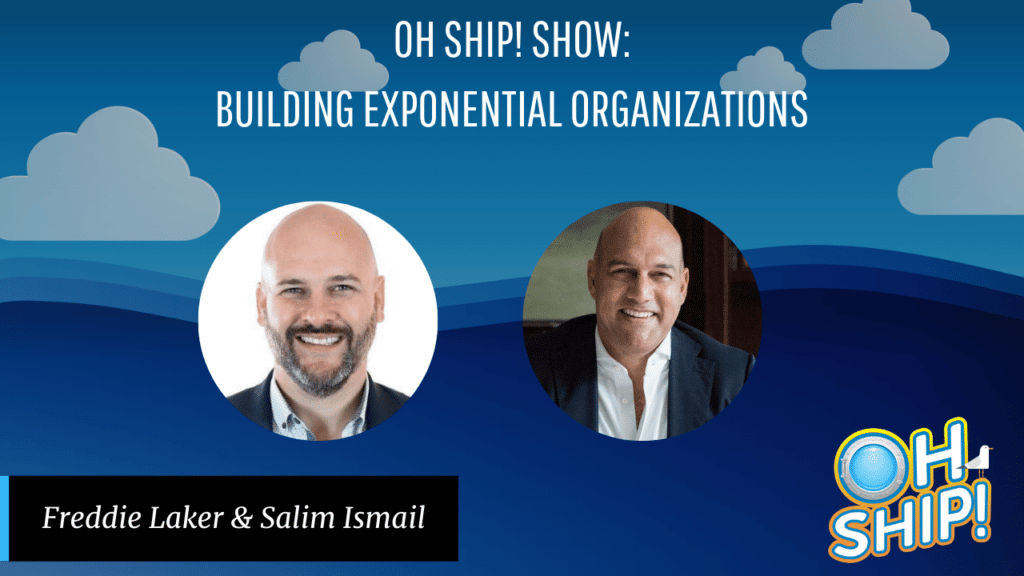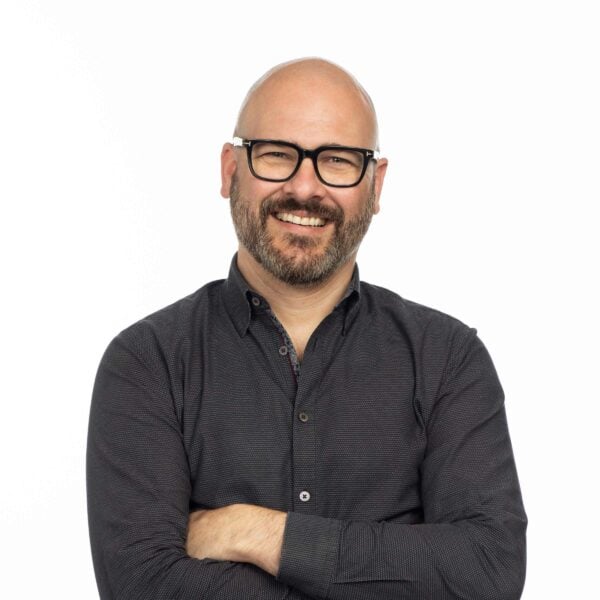Co-Founder and Chairman of OpenExO, Salim Ismail, shares how companies can apply the concept of exponential technologies to entire organizations.
Exponential technology is a technology that effectively drives change at an accelerated speed. Can the concept of exponential change also be applied across an entire enterprise? Yes, companies can grow at exponential rates, blowing past the limits of most traditional companies.
Our recent Oh Ship! Show guest, Salim Ismail, literally wrote the book on this. He was the lead author of the internationally best-selling book, Exponential Organizations. Here’s more on his thoughts on why more organizations should strive to become exponential.
Introducing Salim Ismail

Salim Ismail is a serial entrepreneur and a successful angel investor. He served as the former Head of Innovation at Yahoo, as well as the founding executive director of Singularity University, a university backed by futurists like Ray Kurzweil and Peter Diamandis, who are dedicated to inspiring a new generation of leaders. They apply exponential technologies like biotechnology, artificial intelligence, and neuroscience to solve some of humanity’s greatest challenges.
Presently, Salim is the founder and chairman of OpenExO, an organization with thousands of members around the world dedicated to bringing exponential methodologies to all kinds of organizations, from startups to enterprises.
Freddie: What exactly is an exponential organizationand what are some examples of “ExOs”?
“We used to have an official definition, which was an organization designed and structured to grow 10x better, faster, and cheaper than its peers in the same space. And that was the original design, but the pervasiveness of the model means that now lots of people are doing it. So, we’ve now boiled it down to learning how to do 10x better than other people that are using the same model. We’ve evolved the definition to add a really important piece of it, which is the economic thesis behind it. What we found is that exponential organizations, or ExOs, as we call them, have figuredout how to radically drop the marginal cost of supply.
For example, think about Airbnb where the cost of adding a room to the inventory is near zero. Whereas if Hyatt,has to build an entire hotel. Or in Tesla’s case, we look at the number of moving parts in the drive. A typical combustion engine car, like a BMW, Audi or Toyota, has about 2,000 moving parts in the drive train. The Tesla has 17 moving parts in the drive train. So, we consider Tesla an ExO in terms of design, simplicity, and maintenance. We’re finding now that the real secret behind exponential organizations is they that they’ve figured out how to drop the cost of supply exponentially.”
Freddie: What are some of the main advantages of using an exponential model?
“There’s an obvious business benefit in terms of scalability, butt it’s also good for customers because it’s easy to do business with exponential organizations. For example, Uber is now providing transportation services in every corner of the globe, even in places where taxis, limousine services, or bus services will never get to. Same with Airbnb. It’s creating a radical new model for tourism where people go live in various neighborhoods instead of the touristy hotels downtown. It’s like when Netflix streaming came about; it didn’t actually change that much about the movie-going experience, theyjust added more capability.”
Freddie: Becoming an exponential organization doesn’t happen overnight. How would one go about heading down this path?
“Surprisingly, there are only two pieces to becoming an exponential organization. Number one, you have to embrace disruptive innovation. And number two, you’ve got to solve the immune system problem and stop the company from reacting against change.
This is very hard at big companies. Think of a Roman army decked out in shields and spears marching along in a phalanx formation, trying to deliver the same tube of toothpaste to a million locations at the same time. You come in from the side to do something radically different. It doesn’t matter how nice you are, you’re gonna get speared. Anybody that’s ever been in corporate innovation has arrows in their back from being shot at inside the company. I learned this firsthand at Yahoo. My incubator was set up to deliver and build disruptive ideas that had massive upsides for the company.
But the more disruptive the idea, the less the company can handle it. The way I frame that is that we have 20 “Gutenberg moments” happening at the same time. In the 15th century, the printing press appeared and completely changed the world by democratizing access to literature. Well, solar energy completely changes the world, as well as AI, blockchain, and so on. We’ve got 20 of those hitting us at the same time. So there’s a tsunami of disruption coming in our old models of trying to deliver the same toothpaste into a million places. Corporations are designed for efficiency and predictability. But those heuristics don’t work in the world that’s coming. You need to be adaptable, flexible, agile, and fast.
The best way to do this is to point disruptive ideas into adjacent spaces. Nestle spinning off Nespresso is a great anecdote. They ran an espresso line of business for several years, and it was performing terribly because the company couldn’t handle this totally different business proposition, different brand, different delivery mechanism, and so on. They finally made it a separate entity, and boom—multibillion-dollar line of business almost instantly.”
Freddie: What are some of the attributes of being an ExO?
“There are a lot of core attributes of an ExO that I discuss in my book, but the foundation of an ExO comes from doing something fundamentally different. I remember when the Dean of a major business school came to us as we were building Singularity University and asked how we were doing what we were doing and getting tons of press with just a team of five people, whereas he had a personal staff of 12. So we started researching this and looking at some of the fastest-growing companies at the time.
One of the most important attributes is the Massive Transformative Purpose, or MTP. All the top ExOs have it: Google organizes the world’s information, Uber is everybody’s private driver, and XPrize creates radical breakthroughs for abundance. Each of these companies has a deeply unifying purpose, one that motivates the company toward its goals and serves as the foundation for its existence.
They also scale quickly to keep a small footprint. Uber doesn’t hire its own staff, Ted uses community,Google uses algorithms, andAirbnb is leveraging other people’s bedrooms. You have digital engagement models, gamification, incentive prizes, and now crypto-economics to keep a sticky hold on your customers and incentives for different types of behaviors. And on the inside, we find internal mechanisms that control the framework and manage culture.
One of the biggest priorities to get to the ExO level is to attack the immune system problem, not just in the private sector but in the public sector. Because in the public sector, you have bankers fighting Bitcoin andtaxi companies are fighting Uber. We can’t progress society if we don’t solve resistance to new ideas at the regulatory level.”
Subscribe and listen to the full conversation with Salim Ismail on becoming an ExO on the Oh Ship! Show.





